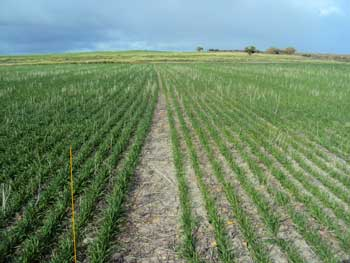Grain growers should seek credible, localised data on new fertiliser products before they pull out their chequebook, according to a recognised soil scientist who recently completed a revealing field trial assessment.
West Midlands Group Ambassador and former Department of Agriculture and Food research officer Bill Bowden will discuss the outcomes of the trial at the West Midlands Group Regional Crop Updates on Friday, 7 March.
The West Midlands Group trial, supported by the Department of Agriculture and Food and the product providers, assessed several products and nitrogen rates on a wheat crop following canola on grey, sandy gravel at Badgingarra.
Dr Bowden said the unique 2013 season emphasised the need to test products across many seasons and sites to adequately assess their suitability for local agricultural cropping systems.
“I’ve been doing work at Badgingarra for more than 50 years and I’ve never seen a season like it,” he said.
“The main plots were sown by the farmer in late May with and without fertiliser to test the products at high and low fertility. Then we had a drought for six to seven weeks followed by the ideal season.”
The nitrogen products were applied at a rate of 12, 24, 48 and 96 kilograms of nitrogen per hectare at the four leaf stage and the test products were applied then and again at the six to seven leaf stage.
The results showed minimal nitrogen leaching over the long, dry period. The subsequent frequent rain and warm nights, provided the right conditions for maximum nitrogen mineralisation.
Low feed availability due to the dry period forced the farmer to put sheep into the crop paddock and the trial was grazed spasmodically for about 10 days, at the 4.5 to six leaf stage, with little or no real damage to the crop.
Despite that, the yields reflected the season, with the control plots with no applied fertiliser yielding 4.2 tonnes per hectare and good protein levels.
The three new products showed no yield gain, while the nitrogen products achieved yields up 6.2t/ha at the highest fertiliser rate.
But Dr Bowden said the trial did not clearly demonstrate the efficacy of the new products.
“This is one trial conducted, in one year with unique conditions,” he said.
“What it does do is reinforce the need for the promoters of any new product to do extensive testing under a wide range of local conditions before it can be promoted with confidence. If they rely on one or two trials their results are too site, season and management specific to be generally promoted.”
Other speakers on the West Midlands Group program include Peter Newman, from the Australian Herbicide Resistance Initiative and DAFWA’s Steve Davies on soil amelioration and lime incorporation. There will also be a series of cropping and mixed farming concurrent sessions and a grower panel on lime incorporation will also be held.
The regional crop updates are supported by DAFWA and the Grains Research and Development Corporation.
For more information and to register, visit DAFWA’s website agric.wa.gov.au and search for ‘regional crop updates’ or contact a local department office.

Media contact: Megan Broad/Jodie Thomson, media liaison +61 (0)8 9368 3937
